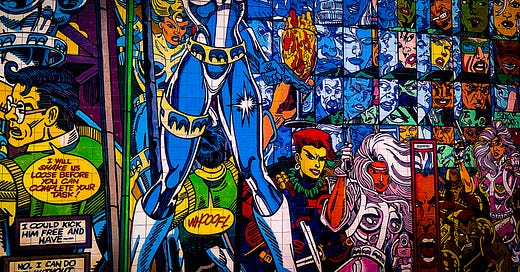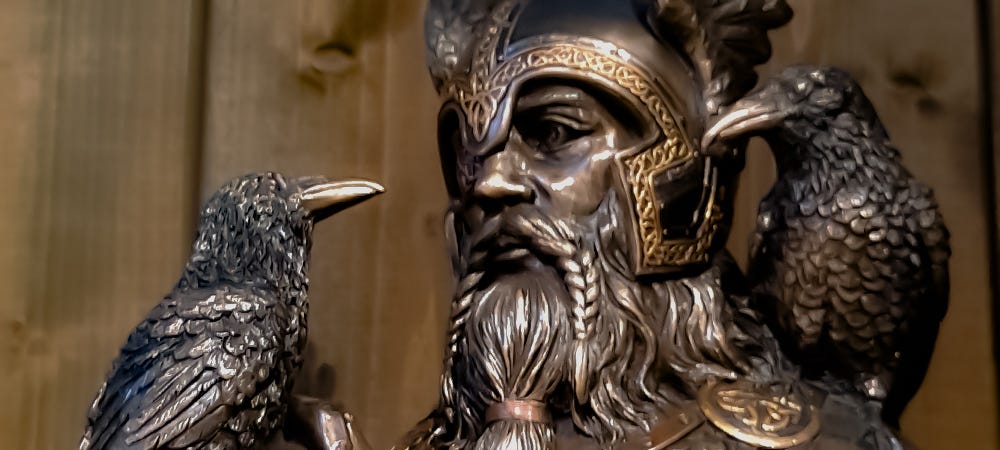swimming in a post-Gutenberg society: May 2023 Essay Recommendations
Why is the best Harry Potter adaptation the next one? Why do people keep 'queering' Frog & Toad? Can you be fun, flirty, Christian, *and* heroic? Answers! Now!
Happy (end of) May! Here’s some of what I’ve read over the past few weeks. Take a gander at the pieces below.
swimming into other psyches
I think people should read, and it’s doubtless that you, my fellow secret-keeper and society-dweller, do as well. But why do we believe that? We must be convinced of some value that the ability to read and habit of reading provide to life. This is what Will Self explores in his LitHub piece, Why Should You Read? Self robustly engages with the question, leading me to anticipate, at several points, that he might come down on the side of: lengthy reading isn’t really necessary in a post-Gutenberg society.
But he comes down correctly enough, I think. (Paragraph breaks are mine—it’s a hefty bit.)
But I stress: this isn’t because I believe it makes us [readers] any better than these others [people who don’t ‘have an intellect and sensibility formed by interaction with texts’] in any other way: it’s simply that to be able to read and not try to at least read well, strikes me as a profligate waste of a skill that [is] difficult to acquire, and one which if mastered delivers such extraordinary delights. So, why read?
Read because short of meeting and communing with them (and perhaps because of this writing about them), reading about diverse modes of being and consciousness is the best way we have of entering into them and abiding there is. To enter the flow-state of reading is to swim into other psyches with great ease, whatever their age, sex, sexual orientation, nationality, class or ethnicity.
There’s this—and, for the more intellectually-minded of us there’s this conundrum: since the linguistic turn taken by Western philosophy in the early 20th century, almost all the turf wars over belief—in its broadest, most encompassing sense—have been waged on the territory afforded by language itself.
bring on Harry Potter TV!
Millennial parents are about to be so sad. The iconic movie adaptations of J.K. Rowling’s world of witchcraft and wizardry are set to be one-upped by HBO Max’s made-for-TV adaptation. While the then-young adults of the Pottermania era will invariably desire the next generation to fall in love with the same things they did (in the same way they did), Yair Rosenberg makes an excellent case for why Harry Potter Was Always Meant to Be Television.
He points out that “many serialized TV shows today…are making it up as they go along, advancing narrative questions without knowing the answers,” which often leads to “audience disillusionment.” However:
One of Rowling’s strengths as a writer, in both her Harry Potter novels and her acclaimed Cormoran Strike detective series, is her ability to tie up her tales in a fashion that causes all prior pieces to fall into place. Whether it’s the origin of the Chamber of Secrets or the true nature of Severus Snape, everything in a given book ultimately adds up. That quality is precisely what makes for a satisfying television drama.
Judging by HBO/Max’s excellent, three-season adaptation of His Dark Materials, the team has proven they have the chops to take a fantastic book series and adapt it for the small screen. And with Rowling on board for the adaptation, what’s not to like?
a read-out on amphibian friendship
Stories have powerful confirmative effects—when we engage with story, we enter a sort of hyper-qualia. We see, hear, and touch in a way that mirrors our own encounters. Just as our own experiences supply certainty to our internal epistemological narratives—it happened, therefore I know, the experiencing of stories supplies validation for metanarratives and shared social identities. This is why fans ‘queering’ relationships that are normally understood to be unromantic in popular stories is so pervasive—Sam & Frodo, Steve & Bucky, Frog & Toad. Societies filled with upheaval and uncertainty look to powerful narratives for confirmation and identity.
Bethel McGrew examines related concepts through the lens of Arnold Lobel’s Frog & Toad stories which were recently adapted into an Apple+ TV series, leading (predictably) to pop-social commentary casting the amphibians as gay icons. Read this piece if you’re interested in stories, what we seek through them, and how stringently we draw meaning and validation from them.
the demand for yesterday
It’s trendy to publicly loathe Hollywood’s tendency to retread well-trod territory with its incessant parade of sequels, reboots, and spin-offs. Professional critics find the rewiring of old tales tiring, but there’s a reason why the movie industry keeps spinning out the familiar—and it’s not just because of money. In his Gospel Coalition piece, Brett McCracken points out that “for overstimulated souls, old narratives are easier.”
Why are appetites for “new” culture waning, while hunger for nostalgia and franchise familiarity is surging? Perhaps it’s because our brains are so overstimulated, so overtaxed in the digital age’s information glut, that we struggle to have the capacity or energy to process anything novel.
That’s one big point. The other one is this: a loss of certainty about one’s identity pushes one to look for frameworks of assurance.
As appealing as…freewheeling identity construction might seem, in practice it’s a source of great emotional stress, spiritual angst, and existential anxiety. To cope with the heavy burden of a “you do you” world—and the loneliness that results from valuing untethered autonomy over relationships of inconvenient accountability—we crave nostalgia. It reminds us of a time when identity was simpler.
McCracken elaborates considerately. Read the full piece: The Longings Behind Pop Culture’s Nostalgia Obsession.
BAMF
When it comes to religious devotion among superheroes, Marvel’s Daredevil is perhaps the most well-known. But in contrast to Daredevil’s broody, tortured faith expression is Nightcrawler, the mutant Tyler Huckabee says made him a better Christian—showing that a faithful life does not have to be all gloom and drudgery.
For example, while Nightcrawler spends most of one 90s animated X-Men series episode “debating Augustinian theology with Wolverine,” Huckabee argues “there’s nothing so strange about being both deeply religious and a party animal.” This will raise eyebrows, but there are points to be made.
Here was a superhero who seemed to genuinely like being a Christian and took it seriously, but was also a fiend for a good time, a trusty drinking buddy for Wolverine and flirty to a fault. Unlike the animated series, the comics rarely put Nightcrawler and Wolverine at odds. The two have one of the strongest bonds in the X-franchise, and their differing opinions about spirituality and what comes next was just one more thread in their friendship.
He was, in other words, someone I could both see myself in and aspire to be.
I love that.
Thanks for reading! There’s loads to come.








